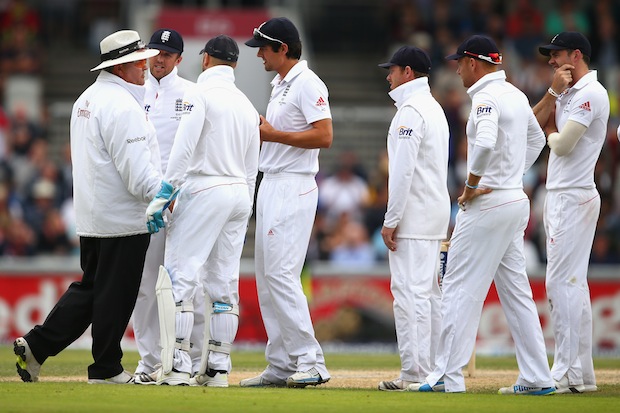Ah, the thwack of leather on willow! Surely nothing could be more redolent of an English summer, or an Australian summer as well. Is there anything to compare with the sight of a ball bowled by a guileful spinner biting and turning as it pitches to deceive the batsman, unless it be a shiny red ball being driven elegantly through the covers with an effortless flick of the wrists?
Except that today the characteristic sound of cricket is a faint click from a stump microphone, and the sight, which rivets a viewer’s attention, is a science-fiction image of a batsman in eerie black and white, with a mysterious dot sometimes appearing on his bat. Or it might be what looks like a hospital pulse chart of a patient in serious trouble, or a comic-cuts picture with a line showing what the ball did or might have done.
After the first two Tests, I may have gloated, as I did in these pages, over England’s triumph, but there’s really no pleasure in witnessing what looked like the disintegration of the Australians. I was pleased — yes, really — by their resurgence at Old Trafford, where they were robbed of victory by rain, and seemingly in the first two days of the Fourth Test, before another lamentable collapse handed the series to England.
And yet the big story about this series has been not a team or a player, but the DRS: the ‘Decision Review System’. This was supposed to make the game fairer and more interesting. Instead it has complicated and perplexed and even poisoned cricket. Now that the system is discredited and undergoing a review of its own, is it too much to hope that the people who govern (or sometimes misgovern) cricket might think again, and scrap the whole sorry business?
Although he wasn’t a pessimistic reactionary himself, George Orwell said that the pessimist does have more reason than others to say ‘I told you so’, since most schemes for betterment do in fact go awry. I thought of that when rereading the excellent Editor’s Notes by Matthew Engel in the 1993 edition of Wisden, the great Cricketers’ Almanack, after the first proposal that umpires’ human judgment could be supplemented by television replays. At the time, it was said that this would only concern ‘line decisions’, stumpings or run-outs, but Engel warned that it might be ‘the first harmless-looking seed that could grow into something that could grow to be thoroughly pernicious’.
It has happened just as he feared, and people have at last woken up. The third Test was played to a cacophony of criticism: ‘D-Day approaches for DRS’ was the UK Times headline, and Mike Atherton, a former England captain, says that Hot Spot — the infra-red camera which shows a dot supposedly where the ball touched the bat, but has proved gravely fallible — must go if any confidence is to be retained in the whole review system. On top of that came the ludicrous accusation from Channel 9 that Kevin Pietersen had used silicone tape on his bat to fool Hot Spot. But maybe the most depressing thing has been the way that Michael Clarke and his team suffered because they haven’t mastered DRS with sufficient cunning.
Some uses of the camera for arbitrating in sport might be justified. After years of thinking about it, English soccer has decided that referees can enjoy electronic assistance for the simple task of deciding whether a ball has crossed the goal-line or not, after notorious cases at the highest international level when a goal hasn’t been awarded when it should have been, and vice versa. But rugby has become downright tedious, with video replays from every possible angle interminably scrutinising a possible try. Even then, there can often be no definitive answer, until we have X-ray cameras, which see through a pile of bodies to show which hand put the ball down.
Of course, umpires can get it wrong, as they always have done. Ask Nathan Lyon. The Australian spinner was given out LBW to James Anderson toward the end of the first innings of the fourth Test. There was no review, but replays showed that the ball would have missed the stumps. That might seem like an argument for the ridiculous panoply of DRS, but there are also howlers when the system is used: ask Usman Khawaja, who was given out caught behind at Old Trafford. This time there was a review, but his dismissal was upheld even when replays suggested that he hadn’t touched the ball.
One huge irony is that if a single man was the apostle of DRS it was Duncan Fletcher. He’s the Zimbabwean player turned coach who is now in charge of India — and India is the one important cricketing country which has refused to allow DRS. As Orwell might have noted, the Indian cricketing authorities are entitled to say ‘I told you so’, and yet both the English and Australian cricket boards, Atherton writes, ‘will be reluctant to backtrack from technology’ because ‘the Indian authorities would leap on any loss of faith in any part of the DRS protocol’, a frankly ignominious argument.
The real argument against DRS is that it’s entirely contrary to the elusive but real ‘spirit of cricket’, a sport whose high traditional standard of honour could be seen by comparing it with soccer. That game is now frankly disgusting, with its orgy of ‘diving’ and other attempts to deceive the referee, which should be called what they are, plain cheating. In cricket, the fundamental principle was that the umpire’s decision was final and that it would be received without protest even by players who knew it was wrong.
As Engel says: ‘Cricket’s great gift to the world was that it was a game based on fairness, trust and phlegmatic acceptance. “Not cricket” is understood in parts of the world where cricket is not understood at all.’ Instead of that, we now have angry dissent — from village cricketers as well as Test players, the humiliation of umpires, whose judgment seems to be irrelevant, and an erosion of trust and fairness throughout the game.
Last Sunday evening, after Ian Bell had made 105 not out, the Aussie players, including the bowlers he had punished, shook his hand and clapped him off the field. That’s cricket. On the other hand, the spot may be Hot, but it’s not cricket.
Got something to add? Join the discussion and comment below.
Get 10 issues for just $10
Subscribe to The Spectator Australia today for the next 10 magazine issues, plus full online access, for just $10.
Geoffrey Wheatcroft, author of several books including The Strange Death of Tory England, is writing a book on the legacy of Winston Churchill.














Comments
Don't miss out
Join the conversation with other Spectator Australia readers. Subscribe to leave a comment.
SUBSCRIBEAlready a subscriber? Log in